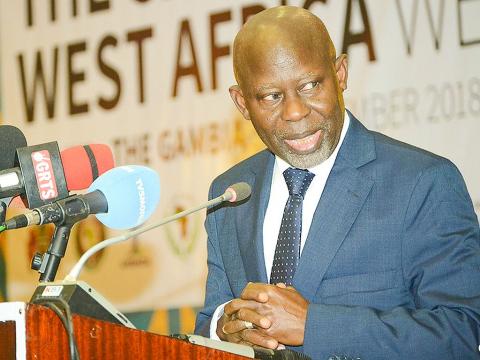By Kemo Cham
The Community Court of Justice of the Economic Community of West African States (ECOWAS) has ordered the Gambian government to pay 10 opposition figures $100,000 each over a 2016 incident in which they were detained and tortured.
The complainants include Ousainou Darboe, the country’s main opposition leader and head of the United Democratic Party (UDP), as well as nine other top members of the party.
The UDP leaders took to the streets in April 2016 in protest against the death of one of their members at the time, Ebrima Solo Sandeng, who later died in the hands of police who were accused of torturing him.
Over 30 people were rounded up by police in the Gambian capital Banjul as a result of that protest.
That protest against former dictator Yahya Jammeh was seen as one of many events that culminated in the electoral defeat of Jammeh who ruled the country for over 20 years with iron feast.
Jammeh was defeated by a candidate of the UDP, current president Adama Barrow, who has since parted way with the party to form his own.
The UDP had asked the ECOWAS Court to declare their arrest, detention and torture unlawful under the African charter on Human and People’s Rights.
A total of 32 plaintiffs jointly filed the case. They asked that the judges declare that section 5 of the Public Order Act of The Gambia is in violation of Article 11 of the African Charter on Human and People’s Rights. They also asked the Court to declare that their arrest, detention, charge and imprisonment for offences under the Act were in violation of Article 4-7 and 11 of the Charter.
The complainants had asked the court for an award of damages in the sum of D10 million as a result of their experience. They also asked for a compensation of D30 million to the Estate of Ebrima Solo Sandeng through the UDP, which is the 32nd applicant in the case, for unlawful deprivation of life and associated loss of life to the relatives and family members.
But the Abuja-based court, presided over by Ghanaian Justice Edward Amoako Asante, ruled that while the arrest of the men was lawful, their treatment in detention, which amounted to the violation of their human rights, violated the charter.
“The detention that followed was arbitrary as the period of detention went beyond the limit permitted by the law of The Gambia before the applicants were brought to Court,” the judge notes in a 39 page ruling.
One of those detained and beneficiary of the ruling, Femi Peters, served as Gambia’s ambassador to Sierra Leone where he died in 2018.
Copyright © 2020 Politico Online









